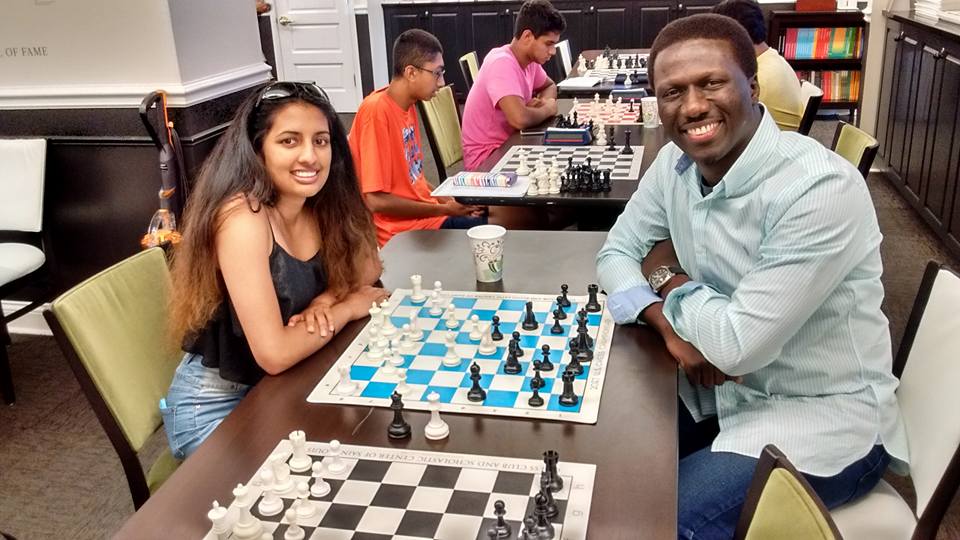
by Dr. O.T. Olabanji, PhD Plasma Physics, Highest USCF Rating = 2332
“Chess is an extremely important game that tweaks the cognitive functionalities, enhances academic skills, aids rapid thought processes, boosts logical and strategic thinking, and helps to gain exceptional memory skills, creativity, focus and discipline” [1-5]. I strongly recommend it for any child or adult who aims to achieve excellence in academia, industry or in any field of endeavor.
If we picture the brain as a computer with a processor, games like chess are known to challenge the brain and stimulate the growth of dendrites [1],[4],[6 – 8]. Dendrites are the bodies that send out signals from the brain’s neuron cells which in turn communicate with other neurons. Therefore, we can be certain that brain growth will result in increased number of dendrites that will improve the neural communication within the brain, thereby optimizing it and making it faster [1], [4],[6-8].
According to numerous studies [1-8], including those cited by the author Samir Becic [1], here below are the ‘top 10 benefits’ of playing Chess. Samir Becic is dubbed “#1 Fitness Trainer in the World” four times in a row, and the author of the book ‘ReSync your Life’. Samir is a motivational speaker who encourages readers to become stronger, leaner, smarter and happier version of themselves.
-
Promotes brain growth
-
It exercises both sides of the brain
-
It raises and enhances cognitive functioning and academic skills
-
It can help prevent Alzheimer’s disease
-
It sparks creativity skills
-
It increases problem-solving skills
-
It teaches planning and foresight
-
It improves reading skills
-
It optimizes memory improvement
-
It improves recovery from stroke or disability
I was able to observe most of these benefits in the students that participated in the Saint Louis Chess Club (STLCC) chess programs, using a combination of our teaching curriculum and the newly improved rubric system that is tailored toward achieving excellence in teaching, learning and skill acquisition in chess. These resources provide instructional, organizational, and preparatory method guidelines that create conducive classroom environment for learning, and also highlight professional responsibilities that address unique needs, culture, systems, and processes across different schools. Special appreciation goes to all school principals, the scholastic manager and the scholastics team of the Saint Louis Chess Club for their excellent and exceptional guidelines, without which these success stories herewith would not have been possible. Some of the success stories from Saint Louis Public School (SLPS) and Lindbergh School Districts are highlighted below. The chess students shown in the pictures below are all A-Star students with excellent grades in STEM Courses (Science, Technology, Engineering and Maths). Some of them are the very best in various subjects/courses in their respective classes and schools, thus exhibiting extremely high academic skills in most areas. In addition, some of the great beneficiaries of our high quality chess programs also include Military Personnel from the ‘Scott Air Force Base’ in Illinois to name a few.
To conclude, I strongly recommend chess to all great sporting agencies, defense agencies, academic & industrial organizations, especially those requiring excellent strategy, creativity, logical thinking and problem solving skills.
Saint Louis Public School (SLPS) District
-
Hamilton Elementary School
Figure 1: A picture showing Dr. O.T. Olabanji (Chess Instructor) and the chess student group that represented Hamilton Elementary School in a Scholastic Chess Tournament earlier on in the year 2018. Two of students: Joel Fortune (Front row & 2nd from the right) and Eric Wallace (Front row & 3rd from the right) came joint first, each with a perfect score of 3 wins in 3 games (3/3) played. The others students also did very well, coming 2nd and 3rd in their respective categories.
-
Carr Lane Middle School
Figure 2: A picture showing some of the middle school chess students during a ‘rapid & classical’ chess class tournament
Lindbergh School District
-
Kennerley Elementary School
Figure 3: A picture showing some of the Kennerley chess students during a ‘rapid’ chess class tournament
-
Truman Middle School
Figure 4: A picture showing some of the middle school chess students. Matthew seen with a trophy came first in two separate scholastic Chess tournaments earlier in the year 2018
References
[1] Samir Becic, “ReSYNC Your Life: 28 Days to a Stronger, Leaner, Smarter, Happier You”, Kindle Edition, October 31, 2017
[2] http://www.healthfitnessrevolution.com/top-10-health-tips-to-improve-your-chess-game/, “ Top ten health tips to improve your Chess game”, August 15, 2015
[3] https://www.chessity.com/en/blog/431/The_Benefits_of_Chess, “The benefits of playing Chess, Sept 12, 2014
[4] Robert C Ferguson, “ Research Benefits: The Use and impact of Chess”, pp 1-7, 2001
[5] Robert Ferguson, “Chess in Education Research Summary,” paper presented at the Chess in Education A Wise Move Conference at the Borough of Manhattan Community College, January 12-13, 1995.
[6] Rafael Tudela, “Intelligence and Chess,” 1984.
[7] James Liptrap, “Chess and Standard Test Scores,” Chess Life, March 1998, pp. 41-43.
[8] James Liptrap, “Chess and Standardized Test Scores,” Chess Coach Newsletter, Spring 1999, Volume 11 (1), pp. 5 & 7.
